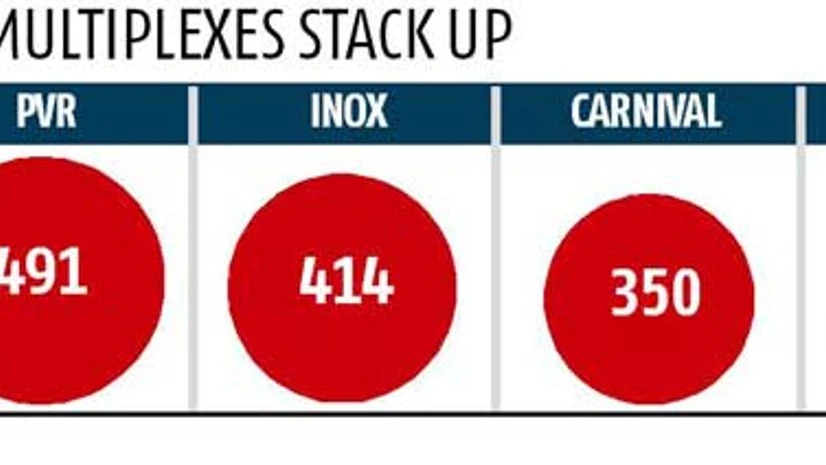Nearly two years after the Kerala-based Carnival group surprised many with its audacious purchase of close to 300 screens from Anil Ambani's Big Cinemas, HDIL and Network's Glitz (Mukesh Ambani-owned), it is stepping into the national arena as a multiplex for small towns and budget conscious moviegoers. With movie tickets priced well below rival multiplex chains PVR Cinemas, Cinepolis and Inox and a burst of 150-odd screens coming up in tier two and three towns over the next year, Carnival is keen to play the volumes game.
For the multiplex business in India, this is a first. In an industry where movie exhibitors have always behaved in a cartelised fashion, Carnival's gamble could shake up the business. Traditionally ticket prices operate within a narrow band and rise and fall according to the newness of the release and its perceived popularity. Prices also vary according to the timing of the show. Among the rivals, PVR sells at a marginal premium over the rest but, the difference is not enough to significantly impact a moviegoer's choice.
Carnival is hoping to change all that. It will price tickets under Rs 100 while rivals charge between Rs 120 and 180 and more. The company is also building a presence in the non-metros. Shrikant Bhasi, Chairman, Carnival Group says it has set aside around Rs 200-225 crore for expansion into small towns.
However, this also means that Carnival is focussed on gathering footfalls instead of stacking up on the latest technology. As a result, its properties have 2D and 3D screens and some have advanced Dolby sound systems(mainly the metros). But competitors offer more: Dolby Atmos, some even have IMAX technology and both PVR and Cinepolis have 4D screens. These chains command a premium thanks to the differentiated experience they bring to the cinemagoer.

Carnival started its cinema exhibition journey with around 50 screens in the south. Its national ambitions came to the fore only recently and in a year, Carnival has added almost 300 screens to its portfolio. The total value of these deals is close to Rs 900 crore.
In case of the Big Cinemas brand, Carnival took over some of Reliance's debt in the business and paid the rest. Carnival raised some funds for the new purchases from a PE based in Singapore, offloading nine per cent stake in its exhibition business for a commitment of $30 million.
Now as it enters the next stage of expansions, Carnival says it will dig into its reserves. Setting up a screen in a tier two or three city/town could cost around Rs 1.5 crore. "We will fund this organic expansion on our own. For expansion beyond these screens, we plan to raise around Rs 350 crore through PEs and VCs," says Bhasi. It is close to signing up with one but the company refused to reveal any details.
The company aims to achieve a 1000-screens-strong network across the nation by the end of calendar 2017. It is already at the 350-screen-mark and will reach 500 by the end of the current calendar. In the next calendar, it hopes to add another 100 screens, organically and/or inorganically. The remaining 400 odd screens, Carnival intends to add by 'charting' single screen movie houses in metros and non-metros.
"Charting refers to management partnerships or deals with single screen owners. In some cases, we may charge a retainer while in others we may take a share of the revenues or profit. We already have a few screens under this model," explains Bhasi.
Hooking the links in the chain
The group is also looking to embed itself deeper into the business of movies. It wants be more than an exhibitor and is therefore stepping up its allied operations - the production and distribution businesses and the events and IP vertical.
Carnival says that it will focus on films with a budget of around Rs 20 crore. It plans to make five odd films a year and is now looking at Gujarati films because the industry, Bhasi feels, is finally coming of age. It has the potential to grow like its Marathi and Bengali counterparts. "So much Bollywood talent is now looking at Gujarati films as a creative outlet," he adds.
For the events and IP business, it has sharpened the focus on off-shore events. It plans to take some of the properties that have been developed such as 'Legends Forever', which tracks the journey of Bollywood legends and organises live musical performances, and 'Shaam-e-Mastana', where artists from two countries (most recently India and Pakistan) perform together into new regions. Carnival must hope that its strategy of entertainment for all at a price that suits every budget will fill up the theatres; movie buffs and competitors are keeping a close watch.

)
